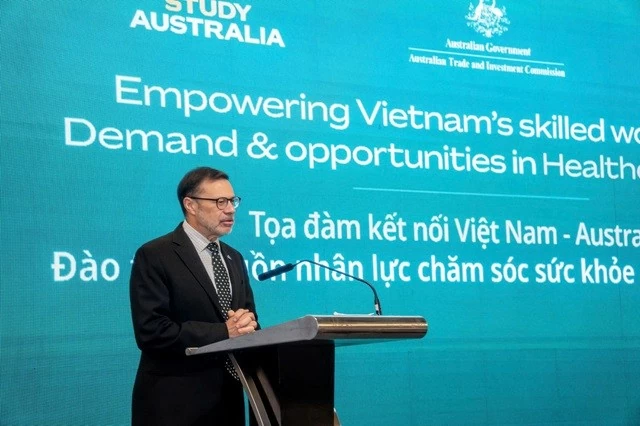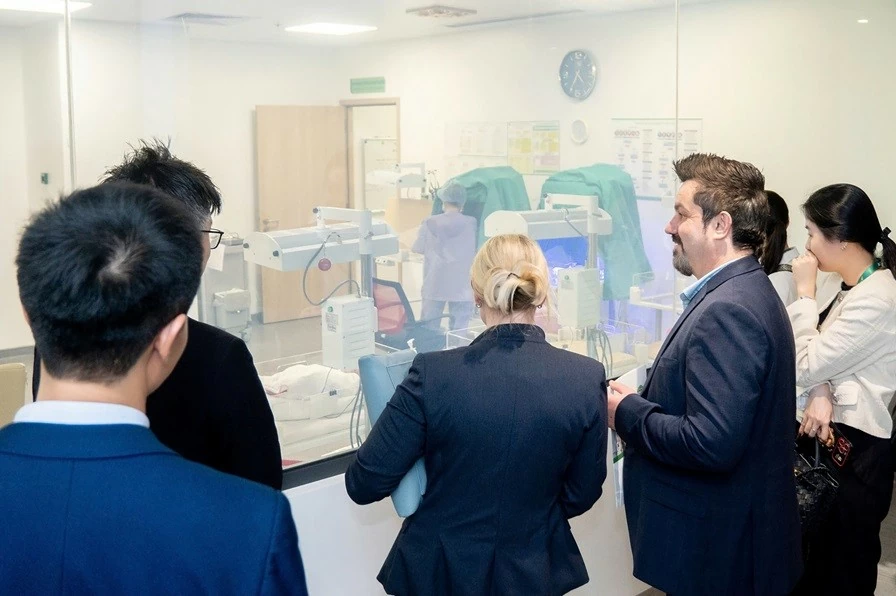
Australian vocaltional education and training delegation visits Vietnam
Latest
 |
| HE Andrew Goledzinowski delivered the speech at Forum. (Photo: Austrade) |
The specialised forums “Empowering Vietnam’s Skilled Workforce: Demands and opportunities in the healthcare sector” in Hanoi and Ho Chi Minh City successfully connected 8 Australian VET institutions with over 140 representatives from industry associations, hospital and nursing centres, and universities in Vietnam.
Vietnam is one of the most rapidly ageing countries in the region and worldwide. It is projected that the country's transition from “population ageing” to “aged population” by 2036 will be much quicker than for other countries.
According to the VCCI’s Elderly Care Service Market Outlook Report in Vietnam, the country has a promising market for elderly care services, with 20 million potential customers by 2035. This is in line with the fact that about 80% of older persons in Vietnam currently need help with daily living activities and receive care from another person. The report also highlights that about 36% of older people and their families are willing to pay for aged care services.
Currently, elderly care is primarily reliant on family members, but this support is not sustainable due to low birth rates, household size, work and study schedules, and the lack of expertise, professional skills, and psychological support required for elderly care.
According to the latest Vietnam population and Housing Census, households with five or more members have decreased 24.3% while single-person households have increased 10.4%. These demographic and socioeconomic shifts highlight the growing demand for social care and health care.
However, the medical care network and formal training within the Vietnamese labour market is still limited, while Vietnam’s private nursing market is in its early stages. To achieve the government’s goal of 35 doctors, 4.5 pharmacists and 90 nurses per 10,000 people by 2050; Vietnam needs 20,000 new graduates per year. The current capacity for training doctors nationwide is about 13,000 graduates per year, according to the Ministry of Health.
Australia's vocational education system is highly regarded internationally. It is characterised by strong industry alignment, flexible delivery and robust systems which ensure consistent quality outcomes for learners. Graduates of the Australian VET system are job-ready and well-prepared to meet the demands of the workforce.
For well over three decades, expertise from this sector has been engaged overseas to support many developing economies. Australian VET providers are in a strong position to capitalise on their established reputation and help to address skills shortages prevalent to key industries in Vietnam.
Education is a foundational pillar of Australia and Vietnam’s bilateral relationship and has been for more than 50 years. The Australia-Vietnam Comprehensive Strategic Partnership (CSP) that was announced by two Prime Ministers in March 2024 expressed the commitment to working together even more to support Vietnam’s human resources development. This includes a pledge to further explore opportunities to increase the cooperation in education and training through two-way exchanges, dialogue and institutional linkages.
“The Australian Government knows how important Australian education is to support Vietnam’s economic development objectives. It is my firm belief that Australian education institutions will be the fuel that powers Vietnam to becoming a high-income country by 2045.”, shared by Australian Ambassador to Vietnam, HE Andrew Goledzinowski at Hanoi’s Forum.
 |
| The delegation visited hospital and nursing home in Hanoi. (Photo: Austrade) |
The Education mission to Vietnam consisting of eight Australian leading VET providers, from 22-25 July, explored an array of lucrative opportunities of Vietnam’s booming senior care market and how Australian VET capabilities match with Vietnamese healthcare training needs.
Australian delegates shared their training expertise and industry engagement experience with Vietnamese healthcare stakeholders at two public “Empowering Vietnam’s skilled workforce” forums in Hanoi and Ho Chi Minh city; gained detailed insights into Vietnam’s healthcare sector development and growing needs for skilled workforce through visits to hospitals and nursing centres in Vietnam.
Ms Rebecca Ball, Senior Trade and Investment Commissioner, Austrade Vietnam emphasised: “Vietnam’s healthcare industry presents a significant opportunity with major private sector investment in the market. The opening of new facilities that are of international standards will lead to increased training needs as well as new occupations emerging, of which Australian skills and training education expertise can help develop the relevant skills needed in the Vietnam’s workforce.”
Addressing challenges in this industry will require a strong partnership approach involving the hospital, local and international training providers. The Forum also addressed the new “Enterprise Enabling Model” and potential tripartite arrangement in the future, between the Australian VET provider, Industry partner, and local VET provider.
An enterprise enablement methodology to workforce development provides a sustainable approach to building employee capability from within an organisation. This approach goes beyond providing traditional training services to working with organisations to understand, plan and jointly execute their human resource development strategy. Training services are aimed at equipping the organisation to sustainably uplift capability and expand capacity for future initiatives.













